For decades, Tom Ryan was the face of CVS and the CVS Golf Charity Classic. Though he retired as CEO and president of CVS Health Corporation in 2011, he’s not done yet. He’s busier than ever, striving to ignite transformative change through results-oriented philanthropy, including a record-breaking $35 million gift to URI this summer.
By Diane Sterrett
Dressed casually in khakis and blue linen that sets off laughing blue eyes and an affable demeanor, Tom Ryan ’75, Hon. ’99, relaxes on the stone patio of his Narragansett home and reflects on career, family, leadership, and giving back.
After a successful 37-year career at CVS, Ryan could surely trade in the spreadsheets for golf clubs. But he’s not built to be idle. “I have a saying—if you’re through changing, you’re through—no matter what age,” he says.
“I have a saying—if you’re through changing, you’re through—no matter what age.”
He radiates high energy, perhaps a result of his high-intensity training and Peloton workouts. “I tell my friends he’s my Energizer bunny, because he never runs out of energy,” says Cathy Ryan, his wife of 33 years. “When one thing’s done, he’s right on to the next.”
Right now, that next thing is starting a venture company with two friends, investing in young entrepreneurs, companies, and ideas. “These are just incredibly talented people who are trying to do incredibly hard work,” says Ryan. “It’s overwhelming how bright, how energetic they are.”
One of them is NexImmune, a biopharmaceutical company that’s trying to crack the code for some forms of cancer using the body’s own immune system to orchestrate a targeted T cell response. Their first product is expected to enter clinical trials this year. “They can actually turn on and off the gene that’s causing the problem. It’s fascinating,” Ryan says. Of NexImmune, he contends, “We’re focused on really big breakthroughs; we’re not looking for incremental change. We want to do something that’s going to have a dramatic societal impact.”
That desire to create transformative change played a part in his family foundation’s original gift that established the George & Anne Ryan Institute for Neuroscience at URI in 2013. That gift combines with the newest record-breaking $35 million gift, and others over the interceding years, to bring the Ryans’ lifetime giving to URI to more than $56 million. This total enters rarefied company for public universities.
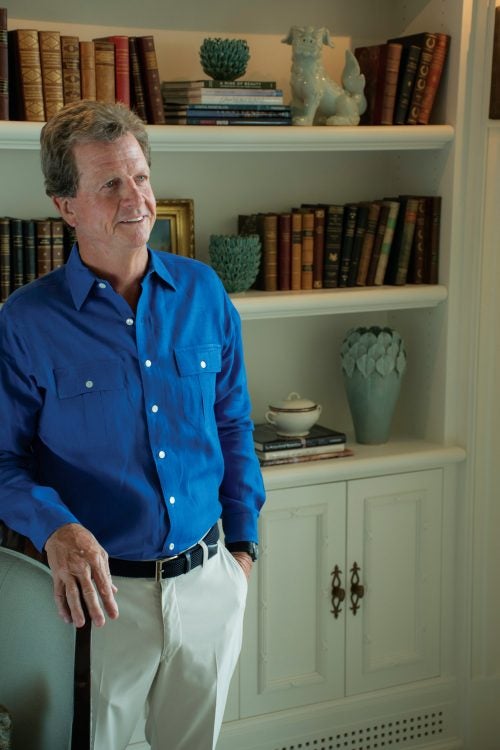
Of the institute’s origin and his family’s contribution that created it, Ryan says, “I wanted to do something on a transformational level at the University. After talking to [URI President] Dave Dooley, my wife Cathy, and our kids, we came to the conclusion that Alzheimer’s and neurodegenerative diseases were where we wanted to focus. Alzheimer’s killed my dad and my mom—my dad from the disease, my mom from taking care of him. Alzheimer’s is a health-care tsunami coming at us. It’s going to be a trillion dollars in health-care costs each year, plus the impact on families. The fact that we were putting our family foundation money in, I wanted something meaningful that would also produce results. Results matter!”
Ryan says the institute is doing some incredible things already, recruiting and retaining top-notch scientists and researchers and being awarded millions in grant money from the National Institutes of Health. “For an embryonic stage institute, they’ve done incredibly well. I am so proud of them. The institute changes things exponentially: It’s good for the University and raises our visibility around research. In recent years, we’ve expanded our research capabilities in important ways under President Dooley’s leadership.” The Ryans’ most recent gift will help the institute continue to do the kind of groundbreaking research it is already engaging in.
President David M. Dooley says he and Ryan share a strong commitment to finding ways for URI to advance both the science and the practice of healing and health, and he says Ryan inspires him with every conversation they have.
“He’s relentless in his push for excellence; when Tom takes on a project, he’s all in until it’s accomplished successfully. With the institute, for example, Tom didn’t just give a gift; he was involved in its founding and development. We all aspire for it to become one of the leading research centers for neurodegenerative diseases in the country, and Tom remains engaged with that goal.”
SEEDS OF SUCCESS
Ryan grew up in northern New Jersey and was the first college graduate in his middle-class working family. Family and sports, baseball and basketball in particular, had the biggest impact on forming his character.
“Sports taught me a lot about teamwork, overall social development, how to work with others. Many times I was the unofficial leader on the team. I think sports help kids learn how to influence people who don’t ‘work for you.’”
In school he had a penchant for math and science. He was inquisitive, always curious to learn more, a side of him you still see. “My parents let us be pretty independent; I think that helped me follow my interests.”
He also admits to being a bit of a prankster, but just enough to push the envelope. “Nothing really bad. For example, in high school there was a teacher who drove a little MG. We took the molding off the exterior doors of the school, and put the MG between the doors—harmless,” laughs Ryan. “I tell you though, it took a lot of people to pick up that car!”
His parents instilled a deep work ethic, as well, and one summer job changed his life trajectory. “In high school I worked at Jay’s Pharmacy in Oradell, New Jersey, as a delivery boy and I thought, ‘This is a pretty good career.’ It combined health care and retail; I have a fairly outgoing personality and I didn’t want to be stuck in a research lab—I wanted to deal with people. So I picked pharmacy as a major when I was 16.”
As an example of Ryan’s characteristic loyalty, Jay’s Pharmacy would be the one independent that, later in his career, he’d declare off-limits for CVS acquisition and for building a CVS nearby.
For college, he knew he wanted more than just a pharmacy school in case he changed majors. He visited URI on a bright sunny spring day and was seduced by the campus, the energetic people on the Quad, and the beach—and his choice was made. “Plus, URI had a great pharmacy reputation.”
A self-described OK student (“organic chemistry was the bane of my existence”), but a quick study, he credits a great deal of his success to URI—relationships formed with fellow students and professors, and lessons learned in and out of the classroom. He knew he couldn’t study in the fraternity house he lived in, so he’d “lock in” at the library for several hours each night.
Rather than the typical drug research track, Ryan gravitated toward classes focused on the business side of pharmacy taught by College of Pharmacy Professor Emeritus Norman Campbell.
Campbell says he taught Ryan in management, pharmacy law, and ethics courses. For a student in the heavily science-oriented pharmacy program, it was a different viewpoint about the profession at a time when independent community pharmacists still had a strong influence.
As Ryan neared graduation, Campbell encouraged him to take a job at a company like CVS, learn what makes it tick, then go out on his own. He took Campbell’s advice, landing an entry-level job at CVS. He worked hard, worked his way up—and never left.
“I think his personality had an influence on his success,” Campbell says. “To know Tom Ryan is to like him. He’s very personable, outgoing, treats everybody with respect. He learns and processes information in such a way that he takes everybody’s view and synthesizes the position. He’s not a pushy, top-to-bottom leader. He’s a person who encourages feedback from his subordinates and colleagues, considers everybody’s view, and processes that information before synthesizing a decision. He’s very much a ‘small-d’ democratic-type leader.”
BUILDING A COMPANY, TRANSFORMING A CULTURE
Ryan credits his natural curiosity as part of what drove his success and longevity at CVS—he stayed, rising through the ranks. “There was always something new, and I loved the business. The company was changing around me—or I was changing the company with the help of a lot of good people—so I was not looking ahead to the next job. I was happy with the job I was in. I was fortunate, we were a young company, growing.”
Ryan was 42 when he became CEO in 1994. Two years later the company went public, which, he says, “scared the hell out of me. But you can’t try to be whatever you think people think a CEO should be. You have to just be yourself.”
That was a seminal moment in the pharmacy industry with a lot of consolidation on the horizon. As a public company, acquisitions were a big part of CVS’ growth from 1997 through 2005. He admits acquisitions took a lot of hard work to blend cultures, systems, and technology. “We had a lot on our plates. It was always changing—new stores, new technology, new people. I always felt challenged and I really loved the people I worked with. I loved seeing them succeed.”
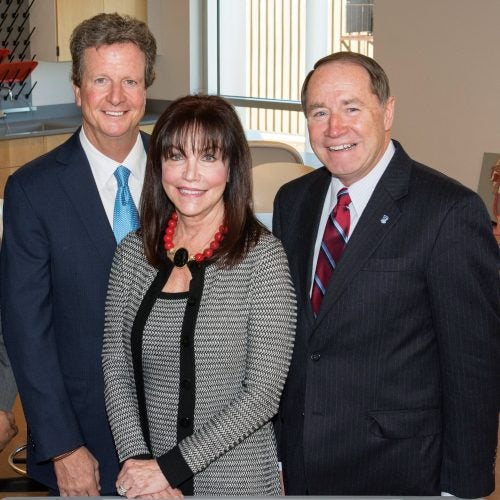
Ryan made leading a public company look easy, though he credits CVS founder Stan Goldstein with creating a great team culture that he inherited, and predecessor Harvey Rosenthal for being a great mentor. “We had fantastic people all around us. I had a great board of directors, we had a good cadre of leaders, and good culture—which is why I love the company. I think culture doesn’t get enough credit. It’s the soft stuff that makes hard results.”
Beyond his vision for growth, Ryan wanted a cultural vision for the company as a whole. Under his leadership, CVS instituted six values of success: respect, integrity, teamwork, urgency, openness, and willingness to embrace change. Those core values grew out of strategy sessions. “We talked about who we wanted to be as a company, what values we had. It really comes back to the leadership issue, and we wanted to lead as a corporate citizen. There’s a compass, things that are not negotiable: how you treat people, honesty, and respect.”
When it comes to ethics, Ryan’s inner compass never wavers, and people remark on his frankness and honesty. “Whatever views he shares with you in a face-to-face or phone call, those are exactly the same views he will articulate in a public setting. I admire that consistency in him, and it reinforces how much you can rely on him,” Dooley observes.
For most of his CVS career, the team culture topped all and they tended not to recognize individuals. Even getting the CEO job was a surprise—he didn’t know he was being considered.
“I thought to myself, ‘We need to make sure people know they are valued and how they’re going to develop.’ We put in a development plan, where people knew they were in line for more responsibility and felt it. Selecting a few key potential players is always a big risk: What about the other people—how do they feel? That’s a real tricky line to walk, but if you’re going to grow a company, you need it. So my last five to seven years at CVS, I started publicly recognizing people for their contributions, and it was meaningful. I only wish I’d done more of that sooner.”
PAYING IT FORWARD
Ryan, who serves as chair of the URI Foundation & Alumni Engagement Board of Directors, has been a philanthropist his entire life, with URI tops on his list. Over the years, in addition to establishing the institute, the Ryans have generously contributed to the College of Pharmacy and URI Athletics, including instrumentally supporting the construction of the 7,600-seat Ryan Center.
The Ryans’ most recent gift will provide ongoing support for the neuroscience institute through endowment and operating resources to further their cutting-edge research. In addition, it will establish the Thomas M. Ryan Scholars program and create a challenge gift for men’s and women’s basketball.
The Ryan Scholars program will give the highest performing high school students a new incentive to apply to URI and vie for four-year scholarships that provide leadership training and unmatched learning opportunities.
The athletic gift is a matching challenge issued by the Ryans—their goal is to drive support for renovations to Tootell West Gymnasium, which will serve as a new men’s and women’s basketball training facility, bringing URI in line with other top-tier programs and providing a competitive edge for recruitment and play.
“If not for URI, I might not be in pharmacy,” Ryan says. “I owe a lot to URI. I’m fortunate I’m in a position to help. State schools are in a budget crunch: We get less than 10 percent of our operating budget from the state. What better way to spend your money than helping students get an education that will last the rest of their lives? Then they’ll give back and contribute. I don’t care what people give, but I would like alumni to make URI one of their top three or four philanthropic choices.”
Dooley says Ryan is the kind of alumnus every institute wishes for. “He wants to see URI meet all the potential it has; he wants to facilitate its growth and trajectory toward international prominence. His wealth of knowledge and experience, his commitment and generosity to the institution, his devotion to the University—all of those things are manifested in Tom in a way that is very rare.”
Shortly after Lil O’Rourke arrived at the URI Foundation (now the URI Foundation & Alumni Engagement) as president, she was tasked with recruiting Ryan to be the board’s chair. It wasn’t too hard a sell, she says, but he did give it careful consideration. She appreciates his directness and accessibility, as well as his leadership.
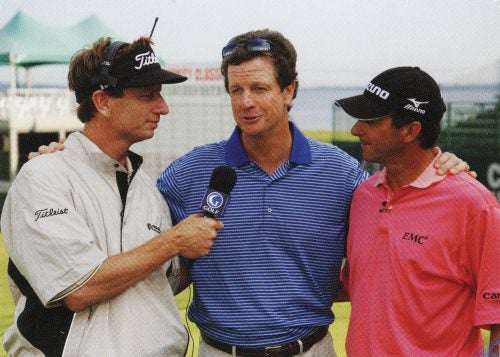
“Every time I’m with Tom or interact with him,” says O’Rourke, “I gain new perspective on leadership. He sets aggressive goals and he’s gotten us to stretch in our fundraising. He’s a quick thinker and is so experienced—he’s seen it all. When you think of his international business reputation, the Ryan Center, the Ryan Institute, and his influence in the state of Rhode Island, he has a deep impact that benefits the University immensely. Through his interaction with other donors and prospects, he gets people involved. The value of that kind of influence and leadership is difficult to calculate.”
Michael D. Fascitelli ’78, Hon. ’08, founder and managing partner of MDF Capital and Imperial Companies, has worked side by side with Ryan on URI matters for more than a dozen years, united by a common passion for helping the school. He says Ryan approaches his work in ways that elevate the University—with vision, leadership, analytics, and a focused and disciplined approach to establishing goals and following up.
“With Tom you know meetings are going to be well-run and well-planned. You know you’re not going to punt on difficult issues. He’s demanding, but inclusive and collaborative.”
Dooley appreciates Ryan bringing his corporate experience to the URI Foundation & Alumni Engagement board. “If we’re going to do something, we’re going to do it right and it’s going to be the best. He has recruited fantastic people to join him in the endeavor who are willing to do it because Tom is there.”
Many who know Ryan say leading by example is part of the secret sauce that makes him successful.
“Tom’s a winner,” Fascitelli says. “Winners win, and he inspires confidence in others that a goal can be met, that something can be done, even if it’s hard. He inspires others to believe in a common goal, to participate in getting it established and executed. He’s a very team-oriented guy, but he pushes people for individual levels of excellence so the team can do better. And that’s a skill. That’s a winner, somebody who can get others across the finish line.”
The two alums also golf together, and Fascitelli says Ryan is very competitive, but incredibly honest and fun to play with. Ryan brought his passion for golf and helping others together in the CVS Health Charity Classic. He was instrumental in launching the tournament in 1999 with pros Brad Faxon and Billy Andrade, but in trademark fashion, he sidesteps praise.
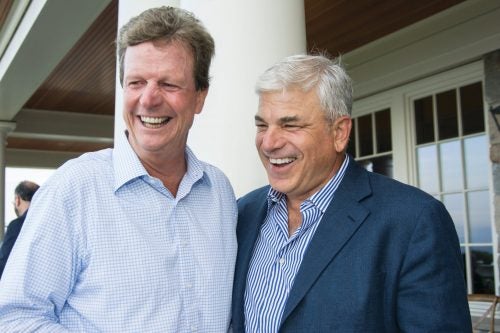
“Our success was due to Billy and Brad; they got the pros to come, and we were fortunate to get some of the best players in the game, many of them Hall of Famers. I’ve always said there are givers and takers in life, and they are all givers. They could have made more money elsewhere, but they came here to help our charities.”
Two decades later, he’s proud of the amount of money the tournament gives back. Just two days long, the CVS Classic is one of the top golf tournaments in terms of the amount of money given to charity—over $20 million to date. And gifts benefit a diverse group of charities, with causes ranging from children’s services to homelessness to the environment.
A 10-handicapper, Ryan’s inner athlete is modest, too, even though he and Brad Faxon won the AT&T Pro-Am in 2003, and his name is etched on “the rock” at Pebble Beach. “Standing on the 18th green and receiving the trophy from Clint Eastwood was surreal. But note: I’ve never won any golf tournament alone. It’s always with a good partner, just like in life.”
Ryan also worked with a nonprofit called Year Up, which gives at-risk young men and women “a hand up, not a handout. It’s where capitalism meets education: We pay young adults to go to school. Show up, they get paid; don’t show up, they don’t get paid; show up late, they get docked. We teach them things you and I take for granted: Shake hands, look people in the eye, keep your head up. To me, 90 percent of life is showing up.”
“I’ve never won any golf tournament alone. It’s always with a good partner, just like in life.”
Community College of Rhode Island President Meghan Hughes worked with Ryan in her role as Year Up executive director from 2009–2015. “The two words that come to mind for Tom are: ‘in it.’ We’d been told Rhode Island was too small to grow the program. Tom rolled up his sleeves and helped me build a strategy to persuade national leadership that we would double, successfully. He has a curious intellect, almost an engineering mind, so he was really interested in the question of, ‘How do you grow a nonprofit business in Rhode Island’s economy?’ He gave very frank feedback, which quickly allowed me to trust him. I knew he stood behind what he was telling me, and that allowed me to go further faster.”
Ryan also made it a point to get to know the students and their stories, sharing his own story of success through hard work to inspire them about what’s possible.
“He was really in it to make sure the organization would be successful, and that had an enormous impact on our young adults. Here was someone with that title, frankly that looked like he does, a 60-year-old white guy in a suit and tie, who was willing to sit down and give them that kind of time.”
IT’S NOT RETIREMENT. IT’S PHASE 2.
People ask how retirement is going. Ryan says, “I can never retire. I call it phase 2.”
He estimates 20 percent of his time is spent on his venture firm; 30 percent on two boards he serves on; then the institute, URI, and the URI Foundation & Alumni Engagement. “The rest of my time is spent with family and friends. It’s nice to hang around with people you want to be with.”
Cathy says when they get a chance to escape, they love Europe or anyplace new. “We both enjoy traveling, and when it comes time to take two weeks off, we do. But before, when he was at CVS? Never,” she laughs.
“Be the hardest working person in the room and life will work out.”
His business personality does seep into family life a bit, says Cathy. “He always wants something to do, so he expects the whole family to rally and stay busy. When we’re all together, we’re on a schedule and he wants to know what are we doing next.”
Ryan is proud of his family—wife Cathy and four children. “I’m proud of all of them, of how they are as fathers and mothers. They are fantastic and just good people, which means the world to me.”
His children say the same of him—and add that he is generous with his time and insights, leading by example.
“He worked extraordinarily hard and instilled that ethic in us,” says son Tim Ryan, CFO at Kate Spade. “We always had a job, and spent at least one summer working for CVS—but in the distribution center, not the typical intern in an office. I think he was trying to show us that whether you’re stacking boxes or the CEO, your job is no less or more important. I learned the value of putting my full self into whatever task I was doing. That’s something he’s always done.”
Now a father of three, Tim is amazed at all his father accomplished while still being fully present.
“He has an ability to step outside himself and relate to each of his children in a different way, make each one of us feel special and drive us in a unique way. If I’m talking to him about fashion, or my stepbrother is talking about his beer company, he’s trying to understand it. He’s an immensely curious person who asks a lot of questions, which is why he has an amazing ability to be relevant to everyone. He has a genuine interest in what people are doing, his mind never stops moving and that’s part of the reason he always has something interesting to say. He’s very infectious to follow, a tremendously charismatic person.”
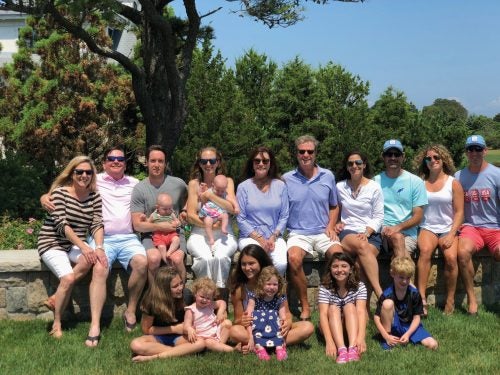
Daughter Heather Leonard, an emergency department physician at Hartford Hospital, agrees. She describes her father as driven and hardworking, but with a gift for being able to make everyone around him feel comfortable.
“He gives me perspective on life and what’s important. For example, when you’re young and all you want is to make a certain team, and you don’t, you think your life is over. He’d tell us, ‘When you fail or hit a roadblock, just pick yourself up and keep going. You can pick another avenue and still get where you want to go.’ Whether it was sports or med school, he’d say, ‘If you want to go for something in life that is hard to attain, you’re going to have to sacrifice. Be the hardest working person in the room and life will work out.’”
Now a mom of two, she says her kids call Ryan “Poppy.” A bright smile lights up his face when he talks about spending time with his eight grandchildren.
“When they come to visit, one of our rituals is that I take them to Dunkin’ Donuts and ask them, ‘What don’t I know about you that I should know about you?’ They’ve come to anticipate it, and prepare for it. One will say, ‘I was in a play.’ Another will tell me math is his favorite subject. They learn from each other, too, and we just have the best time.”
When asked what he worries about now, his answer is thoughtful. “The lack of leadership in our country. Some say leaders don’t matter, but I think they really do, they set the tone at the top. Having said that, I have full confidence in our country and our people that we can withstand some poor leadership for a while. Other than that, I am bullish on this country, I’m bullish on young people. I think our country is in good hands for the young generation that’s coming up.”
By any measure, Ryan’s is an exceedingly accomplished life. But he’s not comfortable with accolades, Cathy says. “He thinks he’s just a regular guy.”
This benefactor, grandfather, and influencer still has his sleeves rolled up and his sights set on big breakthroughs. It’s a safe bet that Tom Ryan, phase 2, will continue to be anything but regular. •
TOM RYAN ON HEALTH CARE
Having spent nearly four decades in the pharmacy world, Tom Ryan ‘75, Hon. ‘99, is still passionate about the industry and sees an increasing role for pharmacists in health care.
“When you look at the value of pharmacy and what it does to reduce hospitalizations, reduce surgeries, and keep people at work, there’s nothing like it. Drugs are our most cost-effective tool. Whether it’s for high cholesterol or high blood pressure or diabetes, think about it: Without pharmaceuticals, where would we be? It’s going to happen with cancer, we’re beginning to see it. And pharmacists are the most accessible health-care provider we have.”
While at CVS, Ryan oversaw the introduction of Minute Clinic, which brought registered nurses and physician assistants into the drugstore setting to increase access to care. At the time, people wondered why. Ryan pointed to the shortage of primary care physicians and people visiting the ER for minor issues. “You can have that same visit at Minute Clinic for $60, while in a hospital setting it costs $250. We have to get smarter. We can’t afford the system we have.”
Taking that idea a step further, Ryan sees a role for pharmacists being involved in health and wellness programs and therapy compliance. For example, if someone is diabetic, part of their care requirement might be to stop in at a Minute Clinic once a month to review their drug therapies and/or diet to see what they’re doing right or where they can improve.
“Patients are going to have to own more of their health. I believe people who don’t will have to pay more for coverage. For example, if you’re a smoker, you’re costing the system money; I think you should pay more for insurance. There are certain lifestyle changes people need to be responsible for. This is not Big Brother, this is just common sense: Bad drivers pay more auto insurance.”
Ryan has a passion for similar innovations that can help make people’s lives better, says his daughter, Dr. Heather Ryan Leonard, an emergency department physician at Hartford Hospital. Issues on her front burner are wait times and patient volume, and they often bounce ideas off each other.
Of these conversations with her dad, Leonard says, “He has so much experience in business and the pharmacy world, and I’m on the other end of things. He’s very interested in how we can help people, make things easier. We talk about the future of medicine or inventions, what could help people have a better quality of life in the future. If he hears about a new innovation or medicine, something up-and-coming, he’ll talk to me about it. He’s very non-judgmental–if someone approaches him with an idea, he’s willing to listen and explore it.”
When it comes to the health-care industry as a whole, Ryan feels the biggest issues are access, cost, and quality, but believes in a smaller, slower approach, rather than a total overhaul.
“We’re not going to fix it overnight. I don’t believe Medicare for All is the answer. My belief is, first, we should take care of the children. All children should always have access to health care. Second, we should take care of catastrophic coverage for all Americans–there should be no family in this country that gets wiped out because of a catastrophic illness. The government can backstop it, it just takes leadership and political will. Third, insurance coverage for families or individuals below a certain income threshold. Let’s start there and see where the market and results go.”
Finally, Ryan sees an investment in technology as a large part of how health care can be improved. “We’re so far behind other industries with use of technology. I don’t mean devices; I’m talking about medical records, sharing of information that could be improved. I think there’s redundancy of cost and misuse of systems, and I think tech can help eliminate that.” •

This was a wonderful article about an extremely fascinating individual and URI alum. I was aware of some of what Tom Ryan had accomplished, but this article gave me new and encouraging insights.
We are very fortunate to be the beneficiaries of Tom’s experience and generosity and I truly hope that his leading-edge thinking and generosity will bear fruit and provide untold benefits to everyone in this wonderful country and indeed, in the world.
Thank you, Tom Ryan
Bob Tetreault
URI 1966
What a wonderful article and story–Thank you. I have known Tom for a long time and the author captures both his personality and intellect perfectly I think. In spite of his New Jersey roots, Tom has become a true Rhode Islander. There are a lot of wealthy people in our State, but few have left as important and lasting a mark on life here as Tom and Cathy. We should all be very proud to have them as part of our community.